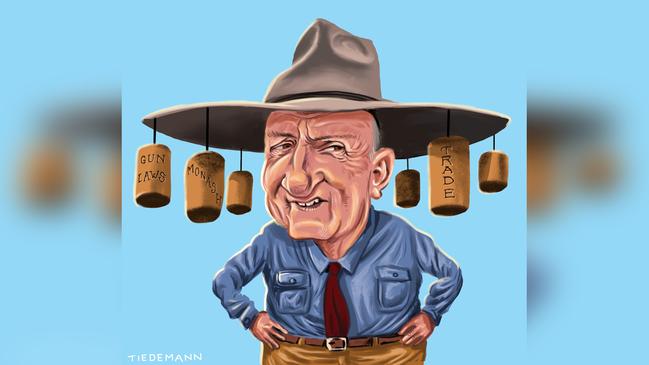
His death last week is a reminder of the dearth of genuine and courageous politicians who prize the national interest over selfish and short-term considerations. It also brings into sharp relief just how degraded the Nationals have become, saddled with lacklustre MPs and leaders struggling for relevance.
Fischer sometimes phoned or emailed me, like many journalists, to provide a perspective on contemporary or historical policy and political issues. He would make the case for Australia becoming a republic, argue the benefits of high-speed train travel or try to enlist me in his long-running campaign to posthumously promote General John Monash to the rank of field marshal.
We talked and emailed about World War I. He felt compelled to tell me he had discovered that 414 chaplains and rabbis “signed up for and served with the AIF” during that war. He was an admirer of the Ireland-born Brendan Bracken, who spent time at Echuca and Orange, was later elected to the House of Commons, became private secretary to Winston Churchill and a minister during World War II.
Earlier this year Fischer called to talk about the release of the Howard government’s first cabinet papers from 1996 and 1997. It was an opportunity to ask what he thought were the most important things he achieved as deputy prime minister and trade minister (1996-99), and as leader of the National Party (1990-99).
“We moved from a multilateral trade focus to open up the bilateral and regional trade linkages as well, with great success to this day,” Fischer told me. “It all started back in 1996, and the change in policy was agreed at the time by the cabinet.
“Arguably it was that cabinet decision that affirmed the decision we made in opposition to pursue not just the multilateral level but all three levels which paved the way. Over the 22 years since, this has had a huge and positive impact on our trade agreements and export efforts for the better.”
As Scott Morrison said, Fischer’s support for uniform national gun laws after the Port Arthur massacre in 1996 was “his finest moment” and “Australia will always be in his debt”. Fischer was matter-of-fact about legislating gun laws, including the controversial buyback, and was eager to share credit with John Howard.
On gun laws, Fischer reflected that it was “very hard” but he and Howard were determined. He preferred not to dwell on the difficulties of the process but the outcome that has served Australia well and made us a role model for other nations.
“Yes, I was hung in effigy at Gympie during a meeting I attended there in June 1996 but the job was done,” Fischer told me. “The pivotal meeting was with the police ministers in Canberra in May 1996, but all having signed up, some then ran away from the agreement.” He was referring especially to Queensland.
As Howard has acknowledged, Fischer had a much tougher task in making the case for uniform national gun laws to National Party constituencies in rural and regional Australia than Howard did to Liberal Party constituencies in our cities and suburbs.
Trade was not always an easy sell for many rusted-on National Party voters either, who were uneasy about the dismantling of the tariff wall and the new era of expanding trade relationships, even though they benefited farming communities by providing access to new and emerging markets for agricultural products.
It is a reminder that the Nationals once had leaders with a huge presence who made their mark on the events and policies of their day. Think Earle Page, Arthur Fadden and John McEwen in the pre and post-war eras; Doug Anthony and Ian Sinclair in the 1970s and 80s; and Fischer, John Anderson and Mark Vaile during the Howard government.
Since then, the party has been led by the bland Warren Truss and Michael McCormack, and gaffe-prone Barnaby Joyce. Fischer was appalled by the trashing of the party’s socially conservative brand by several MPs and he would never have threatened the Coalition’s one-seat majority by quitting to sit on the crossbench, as Joyce has done in recent days.
Fischer believed in the dignity of politics. He studied and thought deeply about issues, and he advocated points of view with logic and reason rather than ratbag reactionary populism. He took public life seriously and he treated all those with whom he engaged — colleagues, rivals, advocates, voters, journalists — with respect.
Like most politicians, Fischer did not get everything right. His response to the High Court’s Mabo and Wik judgments on native title were ugly and ill-informed, even though he reflected the views of many. But his crusade against the far-right One Nation led by Pauline Hanson was principled and fearless. He labelled her xenophobic and nativist comments as “divisive, dumb and wrong”.
Fischer dedicated his life to public service. He was conscripted into the army and served in the Vietnam War. He served in the NSW and federal parliaments for 30 years. He continued to support charitable causes, was chairman of Tourism Australia and ambassador to the Holy See. It is sad that Fischer has gone, at age 73. The Nationals, especially, could do with his wisdom, counsel and example.




Tim Fischer was a true gentleman of Australian politics. He had authenticity, integrity and decency in spades. He was an enthusiastic and effective advocate for rural and regional Australia. His quirky image belied a clever politician who was routinely underestimated by those within the Coalition and his opponents on the left and far right.